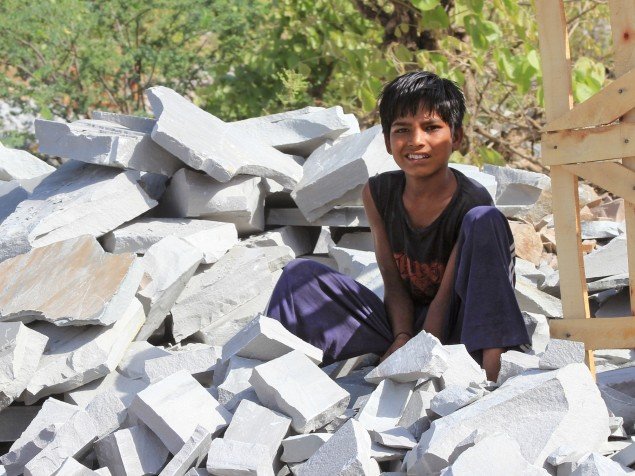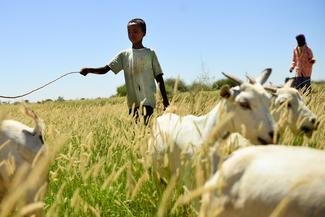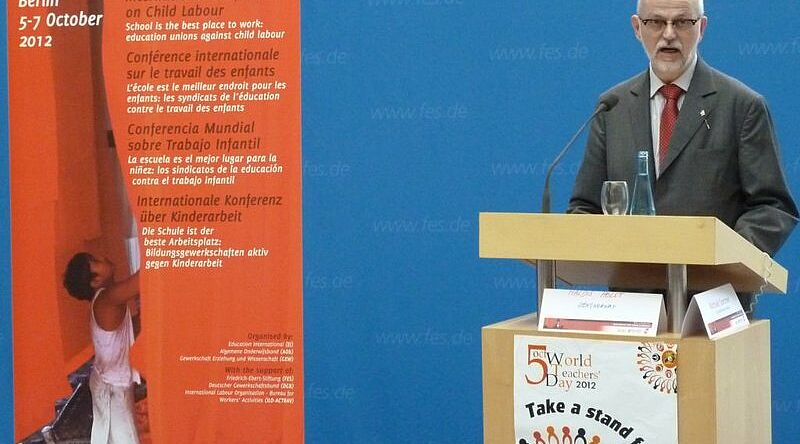Sociologist Manfred Liebel calls for regulation instead of bans
Moderation: Ulrike Timm

The fact that children work is not the problem, says Manfred Liebel – but that they do it under exploitative conditions. Instead of bans, the sociologist advocates safeguards and more commitment to poverty.
Ulrike Timm: UNICEF sees a small light at the end of the tunnel, but the tunnel is very long and the light is not very bright. Today is International Day Against Child Labor, and UNICEF has published figures: 168 million children have to work worldwide, a third less than before ten years – so it got better. On the other hand, if the children’s aid agency continues to say that 85 million children out of these 168 have to work under exploitative and dangerous conditions, then one cannot really speak of success. Exploitative and dangerous, for example, that children are kidnapped by traffickers in Burkina Faso or Mali and then work in neighboring countries in gold mines or on cocoa plantations.
What should I do? How can I help? And do you have to define the concept of child labor differently from a global perspective? I would like to speak to the sociologist Manfred Liebel, whose research focus has been child labor for a long time. Good afternoon, Mr. Liebel!
Manfred Liebel: Beautiful good day!
Timm: Children who squeeze through narrow, dusty corridors in the heat of gold and silver mines – they are so small – you can only outlaw that, or?
Liebel: Yes, there is no question that children who work in mines or are forced to work on cocoa plantations, that this is not acceptable, but that you have to see how you can finally get rid of these types of exploitative work. The only problem is that bans alone don’t solve the problem. And the previous strategies to combat child labor are essentially directed at bans, and too little thought and research is still being done into how it affects children or what can really be done to help children who work, also be protected.
There are a lot of children who do not work under these extreme conditions, but who work in their district or work on the street or also work in agriculture, some of them in their parents’ lay businesses, and that will often be the case that children, for example, are underpaid or not paid at all, but I think a very important aspect to consider is how you are to reach can, on the one hand, that these children no longer have to work, that is, instead of simply outlawing work, do something more against poverty, and that where children continue to work, and above all when they are want to work ensures that they can work in conditions that do not harm them.
Timm: Now you have started your journey around the world. I think everyone agrees, such child slaves in gold and silver mines, you have to outlaw it, forbid it, help where you can, there is no discussion. At the same time, I hear from you that the term child labor is difficult to understand internationally. I’ll put it in concrete terms: the boy who carries the weekly papers in my neighborhood cannot really be compared to a child who knots carpets ten hours a day in Bangladesh. How can you define that at all??
Liebel: Children also work in very, very different conditions in the countries of the global south, and that has to be taken into account more. So in the examples you mentioned, it is clear that you have to do everything so that these children do not have to do this work.
Timm: What would be to be done in these cases?
Open up alternative work opportunities for children
Liebel: Well, there are already actions that involve the fact that children who work in such areas have alternatives. So if, for example, their families and themselves are dependent on a certain income, that they are given alternative job opportunities that they can do under conditions that can of course be done voluntarily, which, for example, also allow them to attend school, that include sufficient recovery times that also ensure adequate payment.
There are such initiatives. So very recently in Bolivia, working children, who have joined together in a kind of children’s union, have been negotiating with parliamentarians about appropriate passages in the upcoming new child and youth law. If this draft, which is now available, becomes reality, then children who continue to work would be protected accordingly.
Timm: Sociologist Manfred Liebel advocates a differentiated view of child labor. Now it makes sense to me that, for example, children in agriculture have always helped worldwide, and that is always the question: is that child labor now or is it just part of it? But what surprises me is that you link the concept of child labor with the concept of self-determination. And I mean, I wonder how much self-determination is there when a ten-year-old has to feed his family and therefore can’t or only go to school very little?
Liebel: I say that you really have to go to the root of the problem, so to speak. Many children have to work because their families are poor, because they depend on income. Or they also have to work partly to even finance their school. There are a lot of children who work above all to buy their school uniforms, to buy the school supplies. There are certainly a lot of children who are prevented from attending school by work, but there are also a lot of other cases. And that’s why I say yes, it is very important that you take a differentiated and closer look, look above all what the children really get from the ban on work, i.e. always look at the consequences and make sure that children find alternatives.
Timm: This means .
Liebel: And these alternatives are not just going to school now, which is important, but the alternatives can also be to offer children legal opportunities to work under conditions they can tolerate. A crucial point is that of course this is done by the free will of the children. But free will, that’s always a relative thing, of course, you’re right. But the children – I learned that in Latin America – often differentiate between the need to work and the compulsion to work. That is a distinction that was not in my mind before, but it is very important because the need to work does not automatically mean that the children then work under conditions that are intolerable to them, but it also gives them a pride that they do something necessary.
Timm: That means that the exploitative and subjugated form of child labor, which of course you do not want either, is ultimately a form of the poverty problem, and the problem of poverty cannot really be solved with a simple worldwide ban?
Liebel: Just like that. That is why I think it is so important that you really think about alternatives and above all realize alternatives.
Timm: Now, very few children who have to work hard, even if they are not enslaved, are now able to represent themselves in a union. The example of what you call from Latin America is certainly a very nice one, but it is probably not very representative, for example, on the African continent. I wonder, of course, that you always feel very good morally and are guaranteed to be on the right side if you outlaw child labor, but what good is that to a carpet-knotting child in Bangladesh, how could you actually improve their situation, in a smaller step than now children’s unions, which are very few in the world, I suspect.
Liebel: Yes, well, let me put it this way, this is only a small minority of children who are organized in these unions, but the unions have and will have a certain resonance in their countries from children, those who are not active there are also noticed, so it is not so irrelevant. But I agree with you that solutions have to be found, let’s say on a more general level and also about laws, of course, but I think it makes a big difference whether you are now simply laying down laws – as has been done up to now – that children are only allowed to work from a certain age, or whether certain protective guarantees are written into the laws that must be guaranteed for children, no matter in wherein Age they are when they work.
And that benefits the children much more than if their work is simply prohibited. Because if it is banned, they no longer have any rights at work, so they are practically illegal. And that’s the big problem that these children’s organizations keep addressing, that the ban is well-intentioned, but ultimately has a negative effect for them at least as long as they have no alternative.
Timm: A counter argument is, of course, that it is understood as a human right or is a human right, that children do not have to work to the limit of exhaustion and cannot go to school, cannot learn anything, and if human rights are not universal but negotiable, then turn the spiral continues to grow.
Liebel: Yes, there is a general right to work, as far as adults are concerned. Fine, but why .
Timm: Apparently more of a duty for children.
Liebel: Yes, but you just look at children or you often say that they work at all, which is bad. There is a certain idea behind it, a certain picture of childhood, which is common here in Europe and is considered normal, but which is by no means normal in many other societies. And I think that children are not the problem, but that they work in exploitative conditions and experience violence or are forced to work, that is the problem.
And in my opinion, you have to get to the root of it, but it is not simply a matter of saying that children in general, if they have not reached a certain age, can no longer work, but really get to grips with the conditions – the conditions change and pass appropriate laws, develop appropriate action plans, which of course must also have the appropriate financial resources and are then really implemented.
Timm: The sociologist Manfred Liebel, today on the day against child labor, and he argues for a differentiated view of the millions of children who have to work worldwide. Mr. Liebel, thank you for talking to us!
Liebel: With pleasure!
Comments from our interlocutors reflect their own opinions. Deutschlandradio Kultur does not adopt statements made by its interlocutors in interviews and discussions.
More on the subject:
INTERVIEW
Before the Bremen Cotton Conference – "In a fair world, there are no T-shirts for three euros"
Consumer researcher calls for environmental and social standards to be enforced at textile companies
12/14/2013 | TACHELES
"Sometimes like Sisyphus"
Development cooperation needs new answers
RELATED ITEMS
-

Child labor worldwide, world vision germany
On this page we give you an overview of the most important information about child labor and approaches of World Vision…
-

Child labor – when being a child fails in everyday life
BY JASCHA SCHULZ | 2015-10-29 18:44 Child labor – When being a child fails in everyday life In recent years, the number of working children…
-
Human rights: child labor – human rights – history – planet knowledge
New section on child labor Knotting carpets by Ulla Rehbein, hewing stones, slaving as house slaves, working in plantations – working all over the world…
-

What to do about child labor: gew – the education union
Many of the goods we consume every day are made by minors. But in the fight against child labor, teachers all over the world play a role…
